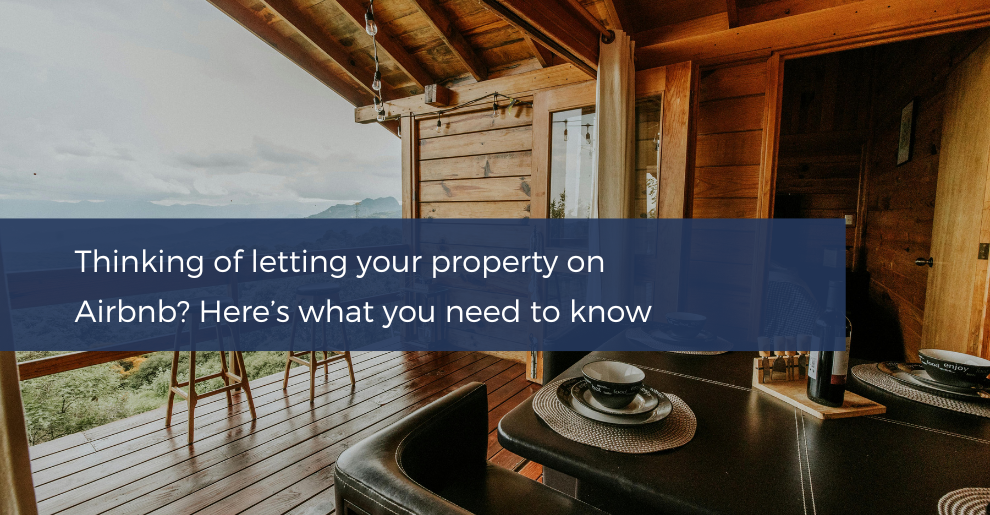Thinking of letting your property on Airbnb? Here’s what you need to know

Short-term letting can be an excellent way to supplement your income, but running an Airbnb is a business venture, not a casual side project. There are rules to follow, permissions to check, and standards to meet if you want to run a compliant and successful short-term let.
This guide provides some points for you to check and consider — from planning and safety to tax and regulation.
1. Plan and Research
Before listing your property, review other local listings to understand demand, pricing, and amenities.
It’s worth writing a simple business plan covering your guest profile and marketing strategy: estimated costs (cleaning, insurance, utilities and tax) and pricing and profit goals.
Check Local Rules and Permissions
Short-term letting may require permission or registration depending on where you are located:
London: Under the Greater London Council (General Powers) Act 1973, whole-home short-term lets are limited to 90 nights per calendar year unless you have planning permission. Airbnb and some other platforms automatically enforce this cap for London listings.
Elsewhere in England: There is currently no national 90-night cap, but councils can set local controls.
The Government announced in February 2024 that a mandatory national register and new planning requirements for short-term lets will be introduced through secondary legislation expected in 2025.
If you own a leasehold, rent, or have a mortgage, you must also check and obtain written permission from your freeholder, landlord, or lender – many leases and mortgages prohibit or restrict holiday letting.
Some professional hosts choose to set up a limited company to separate business and personal liabilities. For casual hosts, this usually isn’t essential, but it’s something to discuss with an accountant if you plan to scale up or operate multiple properties.
2. Prepare Your Property
First impressions matter. Invest in clean, comfortable furnishings and provide the basics guests expect — good beds, quality linens and towels, toiletries, and kitchen essentials. Free Wi-Fi and a simple welcome guide help create a positive experience.
Safety Requirements (Legal Duties)
You must meet specific legal safety standards:
Smoke alarms on every storey used for accommodation.
Carbon-monoxide alarms in any room with a fixed combustion appliance (e.g. boiler or log burner).
Furniture must comply with the Furniture & Furnishings (Fire) (Safety) Regulations 1988.
Gas appliances must be safe and, if applicable, covered by an annual Landlord Gas Safety Certificate.
Electrical equipment must be safe; PAT testing is recommended.
Fire safety: keep exits clear, provide a fire blanket or extinguisher, and display an escape plan.
If your property accommodates unrelated guests or multiple groups, you may need a House in Multiple Occupation (HMO) licence under the Housing Act 2004.
Insurance
Ordinary home insurance rarely covers paying guests. Arrange specialist short-term-let or holiday-let cover that protects against guest damage, public liability, and loss of income.
3. Manage Day-to-Day Operations
Hosting involves more than bookings. Excellent communication and cleanliness drive good reviews and repeat guests. Set house rules on noise, parties, smoking, check-in/out times, and guest numbers to prevent disputes.
Keep neighbours informed to reduce potential complaints about noise or parking.
Airbnb processes guest payments and deducts a service fee before transferring your payout.
4. Financial and Tax Considerations
Operating an Airbnb is a business activity for tax purposes. How it’s taxed depends on how and what you let.
Tax Registration
You must usually register for Self-Assessment with HMRC if you receive rental or trading income.
If your letting qualifies as a property business, you’ll be taxed on property income after deducting allowable expenses.
If it’s deemed trading income (less common), the £1,000 trading allowance may apply.
If you let part of your main home to a lodger, you may qualify for the Rent-a-Room scheme, which allows up to £7,500 tax-free income each year.
Key Tax Changes from 2025
The special Furnished Holiday Lettings (FHL) regime is being abolished from 6 April 2025.
After that, holiday-let income will be taxed in the same way as other residential property income.
This means capital allowances and certain reliefs will no longer apply.
Mortgage interest relief will be limited to the 20% basic-rate tax credit.
Record-Keeping and Making Tax Digital
Keep accurate records of all income, expenses, and receipts — you’ll need these for your Self-Assessment return.
From April 2026, most landlords and property businesses with income over £50,000 per year will have to comply with Making Tax Digital for Income Tax Self Assessment (MTD ITSA), submitting quarterly updates online.
5. Common Issues to Avoid
Neighbour disputes – Noise, parking, and frequent guest changeovers can cause friction. Be proactive and considerate.
Underestimating workload – Cleaning, messaging, and admin take time; budget for professional help if needed.
Insurance gaps – Standard home insurance won’t protect you for guest stays; always have proper cover.
Ignoring tax duties – HMRC receives data directly from Airbnb and other platforms. Non-declaration risks penalties.
Pricing mistakes – Too low wipes out profit; too high reduces occupancy. Review regularly and stay flexible.
Planning oversights – Failing to check local authority rules can lead to enforcement action or fines.
6. Final Thoughts
Hosting through Airbnb can be rewarding, but success depends on preparation and compliance.
Check planning rules, get proper insurance, meet safety standards, and keep good financial records.
If you would like any more information relating to this article, please contact Yaasameen Akhter on 020 8221 8043 or at yaasameen.akhter@bowlinglaw.co.uk
This article is not intended to provide legal advice; it is intended to provide information of general interest about current legal issues.
